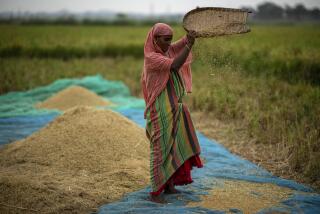ICO Moves to Halt Soaring Prices : Coffee Producers Suspend Limits on Exports
- Share via
LONDON — All limits on the export of coffee imposed under the International Coffee Organization will be suspended today in an attempt to reduce the soaring price of the commodity, a spokesman for the organization said Tuesday.
The spokesman, Peter Knox, said that, with the International Coffee Organization’s average coffee price at about $1.80 a pound, the 75-nation group would act under a rule mandating a suspension of export limits if the price remained above $1.5008 a pound for 45 days.
The coffee organization regulates the annual $10-billion world coffee trade and green coffee prices from its headquarters in London. By adjusting export quotas to balance world supply and demand, the International Coffee Organization attempts to keep world raw coffee prices within a target range of $1.20 to $1.40 a pound.
The price moved above $1.5008 last December, pushed by fears of an acute world coffee shortage because of severe drought damage to the coming Brazilian crop. The 45-day countdown ends today.
Brazil normally supplies about 30% of all world exports and, according to official estimates, expects a crop about half the size of last year’s 30 million bags.
One bag equals 132 pounds, or 60 kilos.
The International Coffee Organization late last year increased export quotas to the maximum 63 million bags allowed under its rules in an unsuccessful attempt to brake prices. Export quotas will be reimposed if the price drops to $1.3455 a pound.
International Coffee Organization executive director Alexandre Beltrao said last week that he expected the price to return to that level if there were no frosts in Brazil this year. But he said that serious frost damage during the Brazilian winter, which runs from June to August, could spark panic buying and hoarding.
Apart from an eight-year break between 1972 and 1980, the organization has been regulating the world coffee market since 1962.
Beltrao said the coffee industry created employment for more than 20 million people worldwide, making it the second most important commodity in world trade after crude oil.
Experts here say the suspension of export quotas will present a challenge to the ICO, especially because it must determine the distribution of the next global quotas and most members are vying for a bigger share.
The present quotas are based on historical export performance, but the individual allocations of the International Coffee Organization’s 50 exporting countries must be revised before the beginning of October.
More to Read
Sign up for Essential California
The most important California stories and recommendations in your inbox every morning.
You may occasionally receive promotional content from the Los Angeles Times.













